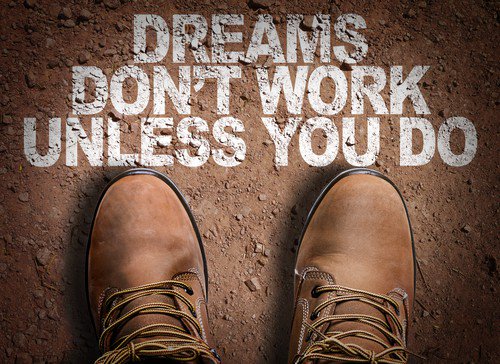We all want something or everything. That’s common for all of us. But the problem with those wishes is that we don’t essentially do what we “MUST” to obtain what we “WANT”.
That creates a certain block within our neuronal network since our brain will not find any justified reason to waste energy on something that is not vital for our survival. Hence, the built-in laziness – the most distinct feature of every mammal on this planet.
The question is: how to trick the brain?
Logic implies that no words can be found on the internet and no personal development program can help with this issue. Otherwise, the world would be full of highly successful people.
We need something far more powerful than just a simple command to ‘Reset, learn and make it happen.’
Is it even possible to trick the brain?
 Yes, it is. The proof can be found in leptin lag. Human brain deliberately delays the release of leptin to make sure we’ve digested a surplus of nutrients.
Yes, it is. The proof can be found in leptin lag. Human brain deliberately delays the release of leptin to make sure we’ve digested a surplus of nutrients.
The reason for this sabotage, that creates a serious condition we call obesity, is the harsh past. The inherently unpredictable environment and frequent scarcity forced our brains to develop a simple prevention protocol. By delaying the satiety signal (release of leptin hormone) for just 15-20 minutes, the brain increases the survival odds. It’s the mechanism that is being transferred through cellular memory on generations.
Creating the optimal environment to add a small adjustment to the primitive code
If a person is lacking the basic discipline, it is likely that the digested (imported) amount of nutrients will far exceed the actual needs and expenditure. The surplus will be converted into fatty acids and stored all over the body. It’s a natural process that happens due to the built-in leptin lag. That’s why it’s so simple to gain weight and so hard to drop even a pound.
With time, the person can become obese.
The problem is obvious. An obese person WANTS to lose weight. But that isn’t happening until the real reason, or the MUST appears. Only after converging these two principles (WANT+MUST), one can start losing weight, stop smoking, stop gambling, stop doing drugs, stop living in a perpetual debt.
In other words, with the successful convergence of WANT and MUST, one can truly influence own future.
How to achieve this vital convergence?
 Does cardiac arrest help the obese person to reconfigure daily habits and induce necessary discipline in order to lose weight and prevent future heart attacks?
Does cardiac arrest help the obese person to reconfigure daily habits and induce necessary discipline in order to lose weight and prevent future heart attacks?
In most of the instances, yes, it does.
Did that person ask for cardiac arrest? Was is it a planned event?
No. It’s a consequence of the innate or deliberate behavior. But enough to converge WANT and MUST and change habits, even unintentionally.
If one day you end up on the street, how would that affect your behavior? Would it change the way you’re thinking about life?
Yes. It’s the absolute event, where you have led yourself, for the first time ever, in a serious survival situation. When something like this happens, the brain reprograms the entire matrix because it becomes clear that something is off.
Of course, due to a complete absence of any sense of hedonism, some people choose to stay on the street. Hopefully, you’re not one of those.
The “comfort zone” problem is blocking you!
So far, life’s been good. A steady job. Lovely spouse. Kids. House. Car.
Yet, it’s a struggle to meet ends. No matter how many hours you work through the week, there’s always that annoying and stressful need for more. Make $3K, it’s enough and not enough at the same time. Make $10K and it’s still not enough.
That’s just one of the paradoxes of our consumer society and there’s nothing you can do to change that. Even if you isolate yourself and disconnect from civilization altogether, you’ll still be consumed by the need – you will still WANT!
What is it that you want?
You WANT more. In fact, it’s clear that you need more. However, you are not doing anything to achieve more.
Why?
You only WANT to live like Donald Trump (before he became president). But nothing is actually forcing the MUST. Because, in reality, there’s no justified reason to live like him. That lifestyle and everything that leads to it, demands extreme energy expenditure and unnatural level of commitment.
You are not alone.
The majority of the human population will rather sit and wait for a miracle (that will never come). Their lives can be observed as one perpetual circle of misery because, in the moments of despair, these people will resort to self-pity and blaming. It will ultimately render them useless.
But…
Take 5 of them. Line them up. Fire their asses. Inform the bank instantly and speed up the foreclosure process. Freeze their assets.
4 out of 5 will become different men. 1 will stay on the streets. It’s just his way of adaptation.
The good example is Elon Musk, who, in one point of time, didn’t have a place to sleep nor food to eat. Look at him now.
Are these radical measures necessary?
Yes.
Otherwise, you’ll never move an inch forward.
As long as your belly is full and you have the roof over your head, regardless of the fact that it isn’t truly yours (mortgage!), you won’t move a muscle to change things.
That’s because we are inherently lazy. Only the state of anxiety and stress can make us move.
In reality, all that people are doing is repeating the same thing over and over again and expecting different results. According to Einstein, that’s the definition of insanity. You simply cannot disagree with the man.
Because, as you could see so far, that practice didn’t bring necessary change.
That’s why you need to add MUST!
And this is where people stop trying. No matter how many expert materials they read, only a quantum of them all successfully changes things.
Their secret is simple:
In other words, what some find discouraging and as the underlying reason to back down, others find motivating.
For example…
Paul’s wife is seemingly happy with what she can afford. She finds her life to be comfortable. As the result, Paul will spend his entire life doing the same thing over and over again because it works. Nothing is forcing him to change things because he is inherently lazy.
Across the street, right opposite from Paul, the situation is different. John’s wife is constantly on his case. She wants more. Coupons and only one pair of branded boots are not what she signed for.
John is facing a dilemma: should he stay or should he go?
This is the basic self-defense situation (fight or flight choice), where the instinctive reaction is to take the flight.
The irony is that John will most certainly feel better and live a healthier life if he chooses the flight option. But the emotional attachment to his wife is preventing him from making that choice.
However, if he stays, John must change things. Built up level of anxiety and stress, accumulated by constant and relentless nagging, is changing his neuronal network. The situation is unbearable and therefore has to change fast because John is spending his life in a constant survival mode.
To compensate, John’s own brain is forcing him to adopt new skills and knowledge in order to deal with the situation and relieve some of that pressure. It won’t be long before John becomes daring enough to embark on something new. It may or may not bring anything good, but given the circumstances, scale is not tipping on each particular end. There’s a certain equilibrium of things where exposure to wife’s nagging and potential risk connected with this new endeavor are of the same weight.
The difference between Paul and John is manifesting through the difference between how they are: A) perceiving stress, and B) assessing risks.
Paul finds stress extremely negative and has a tendency of retrieving to his man’s cave (workshop, garage, nudie bar…)
John, on the other hand, finds stress as a powerful motivator. In other words, in John’s case, WANT and MUST have successfully converged. There’s no daydreaming anymore. Every move has its purpose and status quo is not an option anymore. Staying still in a moving environment creates the sense of anxiety. Opportunity is seized and not passed as the unwelcome breaking of a routine.
This scenario is repeating itself across the globe and throughout the history, proving that self-motivation exists as a personal trait only at those individuals with the developed sense of hedonism. They are genetically preconditioned to act assertive and seemingly selfish.
Their main principle of life is ‘every man for himself’, which is totally opposite from the basic nature of a contemporary human being. It just proves that we are far from the final stage of evolution.
For those that are left without the trace of hedonism, or, to put it correctly, those whom evolved, things are a little bit more complicated.
Self-motivation exists only in activities a person finds amusing and interesting in one particular moment. Everything that goes outside the scope of pure and passionate interest has no real potential to create the necessary boost.
Hence, to kick the ball, one needs the outer stimulus.
In most cases, that’s either hunger (survival mode!), the parent figure or the one’s wife.
A parent, most likely the father, will be that shadow above a man’s head, pushing him forward in a desperate need to prove his worth. The wife has that same effect on the man because he is naturally driven to meet her increasingly high expectations in a perpetual fear from losing her to another alpha male. Everything is encapsulated with the never-ending need to secure the food and other basic needs.
However, the stimulus is sometimes caused by our built-in and constant duality between how we see ourselves and how others see us.
We have an innate tendency to get our expressions approved by our closest social environment. In other words, we need other people to like us and we have to thank mirror neurons and severe lack of hedonism for that.
When it comes to men, it’s either the level of potential violence (power), facial and body attractiveness, or the thickness of one’s wallet. In the end, it’s all sex related because other than being in need for water and food, we are also driven to have sex – frequently.
The real power of these stimuli is found in the absence of one or in assumed inferiority during the standoff situation.
Simply put, between two of us
- Whose violence/power is greater?
If his violence is greater than mine is, I’ll either compensate by arming myself or back down, admitting defeat. It’s a fight or flight response and it’s what separates success from failure and misery.
Choosing to fight, while seemingly counterproductive due to the possible consequences, has a much powerful effect on your neuronal network than retreating.
Retreat inhibits serotonin and dopamine secretion, bringing you to the state of lethargy and acute depression. In other words, retreat makes you feel less happy about yourself, which makes taking action even more difficult.
Fighting even those battles where you don’t stand any chance and where you’ll most certainly end up beaten, ironically, does activate serotonin and dopamine secretion. Bruised, beaten and in pains, you still feel good about yourself, no matter how strange that seems.
And you know that because you have experienced it throughout your childhood!
Every time you hid or backed down, you felt like shit. Every time you chose to fight even though everything has ended with you being badly beaten, you felt proud!
Sure, you lose in either scenario, but the one that includes aggression and assertiveness is rewarded with the most powerful drugs known to the humankind – the ones that make us feel proud and happy with ourselves.
Serotonin and dopamine. Everything comes down to the activity of these two neurotransmitters. It’s all that matters when it comes to personal well-being and self-satisfaction.
The conclusion is simple.
To achieve convergence between WANT and MUST, you have to choose fight response every time. Only then will situation change from simple daydreaming to active participation and pursuit!
That’s why we like and use role models. The role models are benchmarks, and we are doing everything in our power to at least reach that benchmark. It’s a simple standoff where we are constantly assessing our opponent (the role model) in everlasting desire to outperform him or her.
Remember: it’s either fight or flight. There’s nothing in between. What you choose has a profound influence on a level of your self-confidence and self-satisfaction.
Fight = serotonin and dopamine activation.
Flight = misery and underachieving.








